I'm working with words and their phonemes. I found that in my code (and in the console) what looks like two identical strings " 'b eh1 r z'" for example are not returning true when compared, whether with double or triple equals. I did sanity tests in the chrome console, in the node console and in the file itself, and they all return expected results (i.e. only the 'strinfigied' variable seems corrupted. I'm racking my brains trying to figure what's going on. This is what is not workign as expected:
let stringified = trialPhonemeSequence.join(" ")
if (p == "z"){
console.log(trialPhonemeSequence)
let bearstring = 'b eh1 r z'
console.log("SHould be adding 'z' at ", i, "so we got", trialPhonemeSequence, "and stringified", stringified)
console.log(`String|${dictionary['bears']}| length ${dictionary['bears'].length} should equal |${stringified}| length ${stringified.length}: ${dictionary['bears'] == stringified} and ${bearstring == stringified}`);
}
What the Chrome Console outputs
String|b eh1 r z| length 10 should equal |b eh1 r z| length 10: false and false
Here is the entire function up to that point for context. I don't think you want the entire min reproduable code as it requires large dictionaries and datasets and initialization. The goal of this function was to input bear and look for words that are a phonemic match, allowing for addition of a phoneme (the 'z' sound in this test case).
function findAddedPhonemes(word, dictionary, hashMap)
{
let matches = []
let phonemeSequence = dictionary[word]
let phonemeSequenceList = phonemeSequence.split(" ")
for (let i = 0; i <= phonemeSequenceList.length; i++)
{
phonemeList.forEach((p, ind) => // all the items in the list
{
let trialPhonemeSequence = phonemeSequenceList.slice()
trialPhonemeSequence.splice(i, 0, p) // insert p phoneme into index
let stringified = trialPhonemeSequence.join(" ")
if (p == "z"){
console.log(trialPhonemeSequence)
let bearstring = 'b eh1 r z'
console.log(`String|${dictionary['bears']}| length ${dictionary['bears'].length} should equal |${stringified}| length ${stringified.length}: ${dictionary['bears'] == stringified} and ${bearstring == stringified}`);
}
if (stringified == "b eh1 r z"){ //THIS IS WHERE ITS BROKEN
console.log("Bears stringified searching!!!!!!!!!!!!")
}
let hash = stringified.hashCode(dictKeys.length * 4)
if (hashMap[hash] !== undefined)
{
hashMap[hash].forEach((o) =>
{
let key = getObjectsKey(o)
if (checkIfIdentical(dictionary[key], stringified))
{
matches.push(key)
}
})
}
})
}
console.log("Matches", matches)
return matches
}
EDIT (SOLVED):
There is a char 13 (Carriage Return) in Stringified string but not the others. I think I understand where this is coming from. I was inserting a new phoneme with splice in each syllable of the word, and when splicing it onto the end of the words, it's not automatically stripping the '\n', which results in comparison errors. I now know one has to do this manually and wrong hash values. BTW the phoneme dictionary ishere
Thanks @VLAZ !
stringified.split("").map(c => {
console.log(c.charCodeAt(0))
})
console.log("New word")
bearstring.split("").map(c => {
console.log(c.charCodeAt(0))
})
console.log(stringified==bearstring)
